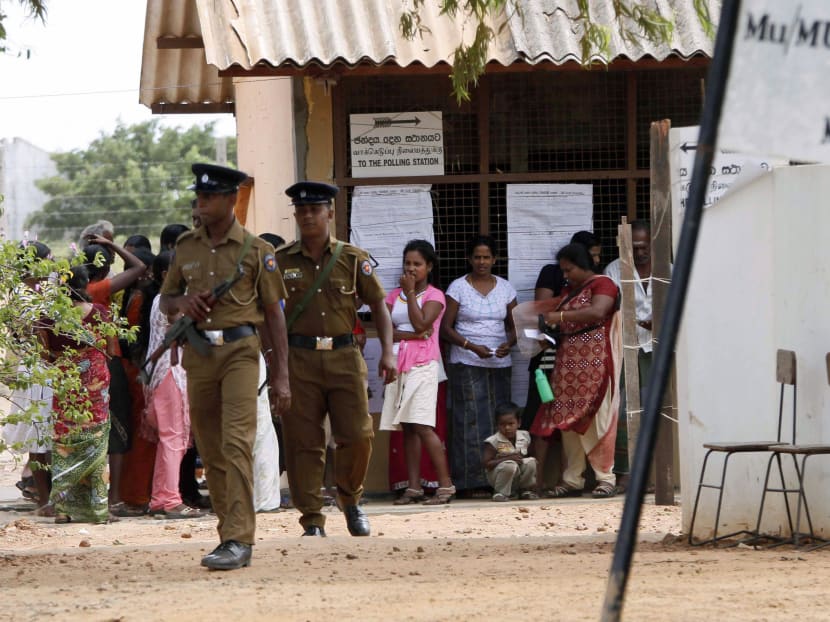Tamils win landslide vote in Sri Lanka
JAFFNA, — A former political proxy for Sri Lanka’s defeated Tamil Tiger rebels swept the country’s northern provincial election, according to results released today (Sept 22), in what is seen as a resounding call for wider regional autonomy in areas ravaged by a quarter century of civil war.

Sri Lankan Tamils stand in a queue to cast their vote as police officers keep vigil outside a polling station in the former war zone region of Mullaitivu, Sri Lanka, Saturday, Sept. 21, 2013 .Photo: AP
JAFFNA, — A former political proxy for Sri Lanka’s defeated Tamil Tiger rebels swept the country’s northern provincial election, according to results released today (Sept 22), in what is seen as a resounding call for wider regional autonomy in areas ravaged by a quarter century of civil war.
The country’s elections commission announced that the Tamil National Alliance will form the first functioning provincial government in the northern Tamil heartland after securing 30 seats out of 38 in yesterday’s election. President Mahinda Rajapaksa’s coalition won eight seats.
The win provides a platform for the party to campaign for an autonomous federal state, although the provincial council is a largely toothless body.
The Tamils have fought unsuccessfully for six decades — through a peaceful struggle and then the bloody civil war — for self-rule.
The elections are seen by the United Nations and the world community as a crucial test of reconciliation between the Tamils and the majority ethnic Sinhalese, who control Sri Lanka’s government and military.
The result also suggests that a vast majority of voters prefer self-rule over Rajapaksa’s effort to win them over through infrastructure development.
However, the provincial council is largely powerless and the new government led by former Supreme Court Justice C V Wigneswaran will have to contend with a center-appointed governor who will control most of the council’s affairs.
Wigneswaran said before the vote that winning the election would give his administration the public backing to lobby for wider powers based on federalism.
But the central government is against devolving any substantial power and says even existing powers in provincial hands, such as those over land and policing, are a threat to the country.
The country’s ethnic divisions widened with the quarter-century civil war that ended in 2009 when government troops crushed the Tamil Tiger rebels, who were fighting to create an independent state. At least 80,000 people were killed in the war, and northern cities, including many on Jaffna peninsula, were reduced to rubble.
Tamils have been demanding regional autonomy to the country’s north and east, where they are the majority, since Sri Lanka became independent from Britain in 1948. The campaign took the form of nonviolent protests for many years, but in 1983 civil war broke out between government forces and armed Tamil groups calling for full independence.
The provincial council was created in 1987 as an alternative to separation. But the Tigers - the strongest of the rebel groups, and eventually the de facto government across much of the north and east - rejected it as inadequate. The fighting that followed prevented the council from functioning.
The military defeat of the Tigers meant Tamils were back to where they had started 60 years earlier, with no tangible achievement, tens of thousands of deaths and losing another million people who fled the country as refugees. AP






